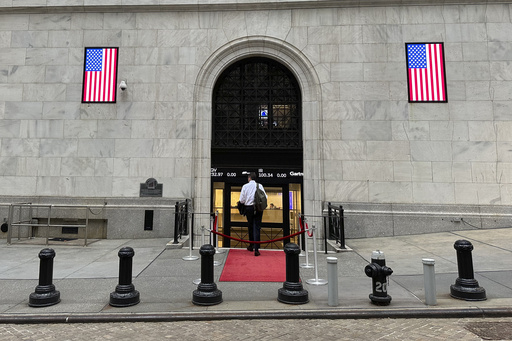NEW YORK (AP) — Some of Wall Street’s most influential stocks are dropping again on Wednesday, hurt by worries about worsening trade tensions with China. That’s dragging market indexes lower, but conditions may be less discouraging underneath the surface, and roughly as many U.S. stocks are rising as falling.
The split left the S&P 500 sagging by 1.1% a day after it set an all-time high for the 38th time this year. The Nasdaq composite was down 2.3% and on track for its worst day since October, also weighed by losses for such market heavyweights as Nvidia and Broadcom.
But the Dow Jones Industrial Average was adding 130 points, or 0.3%, to its record set a day earlier, as of 10:15 a.m. Eastern time. The smaller stocks in the Russell 2000 were also holding up better than the rest of the market, down just 0.2%, after roaring in recent days on increasing hopes that interest rates are about to get easier and the U.S. economy will avoid a recession.
It’s a continuation of a recent trend that market watchers have called encouraging, one where more stocks are rising rather than just a handful of overpowering elites.
The market’s spotlight was squarely on chip companies, which tumbled after a report from Bloomberg News said President Joe Biden is considering the most severe trade restrictions available if companies like the Netherlands’ ASML and Japan’s Tokyo Electron continue to ship advanced semiconductor technology to China. The U.S. government has blocked Chinese access to advanced chips and the equipment to make them, citing security concerns, and urged its allies to follow suit.
ASML saw its stock trading in the United States drop 10.9% even though it reported sales for the spring that came in at the high end of its forecasted range. Shares of Tokyo Electron, meanwhile, dropped 7.5% in Tokyo to cull its gain for the year to 32.2%.
Another major chip company, Taiwan Semiconductor Manufacturing Co., sank after former President Donald Trump criticized the self-governed island claimed by Beijing, which the U.S. is obligated by treaty to defense if it is attacked.
“Taiwan should pay us for defense,” Trump said according to a transcript of an interview published by Bloomberg. “Taiwan took our chip business from us, I mean, how stupid are we?” he said.
TSMC’s stock trading in the United States dropped 7.1%.
Reverberations reached chip stocks around the world, including big U.S. players that have been some of Wall Street’s biggest stars this year amid a frenzy around artificial-intelligence technology. Nvidia fell 6.1% after soaring 155.2% this year through the day before.
Advanced Micro Devices fell 7.4%, and Broadcom dropped 5.5%.
Big Tech stocks’ movements have an outsized effect on indexes like the S&P 500, which give more weight to companies of bigger size. That was a boon in recent years, when Big Tech was able to soar regardless of what the overall economy and interest rates were doing. That helped mask weakness underneath the surface as the economy struggled through worries about a potential recession because of high rates meant to snuff out inflation.
Now, though, some critics call those Big Tech stocks too expensive, and investors are starting to pile back into unloved areas of the market. The economy has remained remarkably resilient so far, with the job market remaining solid, and investors widely expect the Federal Reserve to begin cutting interest rates in September because inflation has slowed.
Johnson & Johnson, whose stock is still down slightly for the year so far, jumped 3.6% after topping analysts’ forecasts for profit in the latest quarter. It was one of the largest reasons the Dow Jones Industrial Average was able to rise despite the tumbles for chip stocks.
U.S. Bancorp, which has also lagged the rest of the market this year, rallied 4% after topping analysts’ forecasts for profit and revenue.
On the losing side of Wall street was Five Below, a retailer targeting teens and tweens with products priced at $5 or below. It tumbled 15.3% after its CEO, Joel Anderson, stepped down from his job and from the board “to pursue other interests.” It named company co-founder Thomas Vellios as executive chairman on an interim basis. It also gave a profit forecast for the second quarter that fell short of analysts’ expectations.
Spirit Airlines lost 7.1% after the discount carrier cut its forecast for revenue in the second quarter. It said it’s making fewer dollars from fees outside of tickets than expected.
J.B. Hunt Transport Services fell 4.7% after it reported weaker profit and revenue for the latest quarter than analysts expected. The freight company was hurt by higher insurance and claims costs, among other things.
In the bond market, the 10-year Treasury yield ticked down to 4.15% from 4.16% late Tuesday.
In stock markets abroad, London’s FTSE 100 was 0.4% higher after data showed the inflation rate remained steady at the Bank of England’s 2% target in June.
Indexes were mixed elsewhere across Europe and Asia. Hong Kong’s Hang Seng gained 0.1%, while stocks sank 0.5% in Shanghai as traders await the outcome of a top level policy-setting meeting of the ruling Communist Party, which wraps up on Thursday. The closed-door gathering in Beijing is expected to endorse leader Xi Jinping’s vision for investing heavily in strengthening China’s self-sufficiency in advanced technologies.
___
AP Business Writer Elaine Kurtenbach contributed.
Source: post





